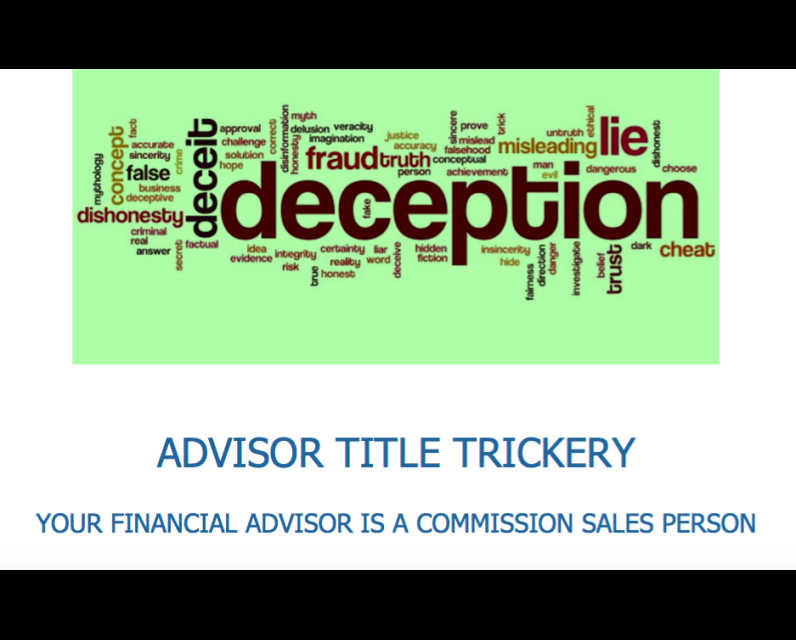Unpublished Opinions
His 2018 Book "About Your Financial Murder..." is found on Lulu.com http://www.lulu.com/shop/http://www.lulu.com/shop/larry-elford/about-you...
Investment Misconduct and Malpractice Analyst
Larry Elford is acclaimed as a qualified expert on the subject of White Collar Crime as it relates to the investment selling industry. He is a retired CFP, (Chartered Financial Planner), a CIM, (Certified Investment Manager) by the Canadian Securities Institute, a FCSI, (Fellow of the Canadian Securities Institute), the highest designation awarded by the Canadian Securities Institute to those for top achievements in educational and industry accomplishments. He is also an Associate Portfolio Manager and Director of the Canadian Justice Review Board of Canada.
Larry worked inside the largest financial institutions in Canada for twenty years until his retirement in 2004. He works today writing, speaking and coaching Canadians on how to create safe and honest treatment for investors.
Larry Elford is also an author. He was included in John Lawrence Reynolds’ second edition bestselling book, The Naked Investor, Why Almost Everybody But You Gets Rich On Your RRSP and Bruce Livesey's 2012 book, Thieves of Bay Street, How Banks, Brokerages and the Wealthy Steal Billions from Canadians. He self-produced a documentary film, Breach of Trust, The Unique Violence of White Collar Crime, to benefit investors, legislators and those who investigate financial crime. It can be viewed on Youtube. https://youtu.be/k2K6pzFtyTU
Twitter: @RecoveredBroker
Facebook group for Fraud victims
https://www.facebook.com/groups/albertafraud/
Facebook group for Fraud victims across Canada (Small Investors Protection Association of Canada, 1998)
https://www.facebook.com/groups/240100382792373/
Video site for victims of investment malpractice
http://www.youtube.com/user/investoradvocate?feature=mhe
www.investoradvocates.ca research site
His first book is Titled "ABOUT YOUR FINANCIAL MURDER..." detailing the extent of financial abuse of the public attributable to a "self" regulated investment industry.
His second book, published in April of 2020, is "Farming Humans" and is about "How to quietly strip America bare of the truth "all men are created equal”, found in the U.S. Declaration of Independence, in less than 250 years….http://www.lulu.com/shop/larry-elford/farming-humans/paperback/product-2...
SIPA Study Finds 100,000 Fake Investment Advisors in Canada

SIPA report shows most Financial Advisors are registered as commission sales persons
Google+
Share with LinkedIn
TORONTO, Dec. 5, 2016 /CNW/ - Small Investor Protection Association publishes a shocking report "Checking an Advisor's Registration – Above the Law". The report reveals 96% of Financial Advisors are registered as commission sales persons. The report critiques the regulators approach for investors to check their Advisor's registration and states "when you check your Advisor's registration and see that they are indeed registered, the probability is very high that they are registered as dealing representative or in plain language a sales person".
Data compiled over several months was obtained from the provincial securities administrators regarding the registration of representatives. Although advertising suggests the industry will look after client's best interests the shocking truth is the investment industry is using a majority of commission sales people to convince investors to buy their financial products. The report also discloses that the investment industry's failure to use representatives' registered classification appears to be against the law which is the provincial Securities Acts.
There are some representatives registered as "Portfolio Manager" and "Advising Representative" that are required to look after clients' best interests, but the majority of representatives is registered as "Dealing Representative" or sales person without a requirement to look after clients' best interests. It is a system of awards for selling that motivates the sellers to push products that maximize commissions. It should be a system of providing financial advice in the best interests of clients. The registration check should be more user-friendly to enable investors to quickly determine a representative's true registration category and qualifications.
This report is available by contacting SIPA to request a pdf copy by e-mail or on SIPA's website http://sipa.ca/library/SIPAsubmissions/500_SIPA_REPORT_REGISTRATION-Abov... .
About SIPA: The Small Investor Protection Association (SIPA) was incorporated (Ontario corporation number 1327366) as a national non-profit organization at the end of January, 1999. SIPA is a voice for small investors and advocates for the interests of investors.
SOURCE Small Investor Protection Association
For further information: Stan Buell, President, Small Investor Protection Association, tel: 614-416-4238, direct: 902-569-4238, sipa.toronto@gmail.com, www.sipa.ca, stanbuell@gmail.com
After working in and around the investment industry, I think the most interesting secret I may have observed, which is still in active hiding today (2016) is that there are actually two drastically different types of investment industry “adviser”.
At this time, the investment and regulatory industry is not telling consumers/investors of the different standards.
They are keeping this information from consumers, while dealers profit from what I am calling ‘regulatory arbitrage’. In English that means if you can slip a commission-investment-salesperson under the radar, by mis-spelling the lawful title used in the Act, you can evidently get away with a bit of a bait and switch. Professional codes of ethics, industry rules and Securities Act laws can be ignored as easily as breathing.
Consumers are not told of the difference, nor of the fact that laws and rules that keep investors fro harm are routinely ignored for profit. Easily half of Canadians future retirement money can thus be siphoned off to investment dealers and advisors, acting outside rules and laws. No police will respond to such systemic violations of you. No amount of prosecutors would raise an eyebrow.
The legal type of “advice giver” is spelled “Adviser” in law, and it is found in the Securities Act in your province.
The non-legal, non-regulated type is usually spelled “Advisor”, although there can be up to 38 other non-lawful “titles” that some salespersons will use, all to avoid having to refer to their true license and registration category, which is a commission-sales category, not an advice category.
Most remarkably, top securities regulators in Canada tell us (but not consumers:) that these two words do not mean the same thing. The secret is that while dictionaries and newspapers use the words interchangeably, and most investors assume they mean the same thing, the truth is that if you have a financial “advisor”, you definitely do not have a lawful financial “Adviser” with the duty of ‘do no harm’ to the investor. The industry, however is spending untold millions to cause you to believe that you do….just not to deliver.
Most consumers know full well the difference between shopping at a quality big box store, as opposed to shopping at the ‘Lucky Dollar’. Investments are intangible, so investment dealers can get away with telling you their products (or their ‘advisors’) are top quality, and the only proof you have is in the truth of their word….and faith in protective law. Neither of which applies to systemic issues in the investment industry.
The underlying mechanics of the issue is that one (Adviser) requires a fiduciary duty (somewhat similar to a medical oath to not harm the patient) while the other (Advisor) is not found in law, so is “governed” if you will, by self regulation, and industry ‘self’ enforcement, which is to say, not at all. The ‘self’ titled ‘Advisor’ can sell you anything which their dealer determines as “suitable”, even if it is the highest cost, highest commission, lowest performing investment. They do not tell you this, and the regulators blindly see no public protective issues. Systemic seems to mean ‘invisible’ to regulators.
A suitability standard would be akin the to standard of products found in the Lucky Dollar Store, and it simply means that they feel the the product is “good enough” to sell.
In the end, 330 million Americans and Canadians are unaware of the two spellings, thanks completely due to Securities Commissions who have far more powerful incentives to protect the industry, and weak incentives to protect the public. Investors are thus “set up” to believe what they are told, and not told what they should believe.
The purpose of this article is to attempt to lend some fairness and balance to the investor, so they can be better informed of whether they are investing in world class products and advice, or investing their life savings in Dollar Box Store products.
If you feel that this issue is important to the socio-economic security of Canada, or to the U.S., please ensure your concern is addressed/corrected by your elected representatives, or vote in someone who will ensure fairness, honestly and good faith.



Comments
Be the first to comment